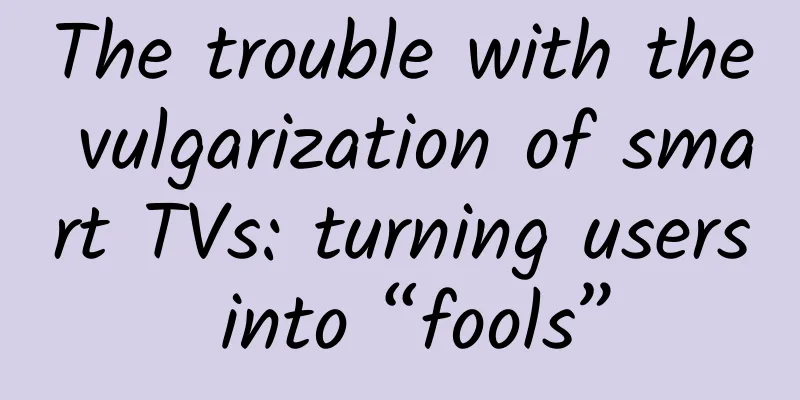The trouble with the vulgarization of smart TVs: turning users into “fools”

|
Compared with ten years ago, the functions of smart TVs are becoming more and more advanced. However, as the largest information window in the home, TV sets, in addition to providing news and entertainment content, pay less and less attention to the public's scientific education needs. The international trend of cord-cutting - cutting cable TV and replacing information receiving functions with third-party devices such as mobile phones - is becoming more and more obvious in the Chinese market. Chinese TV manufacturers have been intensively and stubbornly focusing their R&D efforts on entertainment and interaction. Industry observers have compared the self-proclaimed "smarter" TVs to turning users into "fools". It is precisely because TV content platforms tend to be purely entertainment-oriented and lack scientific education content for all age groups that the public's perception of smart TVs has become increasingly biased. Encouraged by platform operators who want to earn more commercial profits faster, the current uses of smart TVs have in fact been formatted as "entertainment". The seemingly rich but actually single functional positioning has driven away the public's interest in this "family knowledge window" screen. Being able to only "watch shows" on TV has become a consumer trap for more family leisure, which has further accelerated the fading of TV from the center of people's lives. The vulgar big screen "Big Boobs and Fresh Meat", "Hengdian Ghost Fight"... We have to admit that popular IP TV series have indeed stimulated the viewing enthusiasm of some groups, but we have to admit that commercial TV content has squeezed out the audience's right to choose, while narrowing the audience group and reducing viewing interest. Programs that care about children and the elderly are gradually missing, and television has played the negative role of making the screen "vulgar". "I won't let my children watch TV at home." For parents, TV has gradually become the mortal enemy of exam-oriented education. "Children will not learn any knowledge from TV that will help them with their studies." But the reality is that even if the TV is turned off, when parents are not around, students will choose to use mobile phones, tablets and other devices to secretly kill time after class. Mobile phones, as a new entertainment carrier, have gradually surpassed TV and become a new platform for people to receive information and watch videos. According to data released by the Ministry of Industry and Information Technology, the number of mobile phone users in China has exceeded 1.4 billion, and the average mobile Internet access traffic per household in October this year was 2.25G. In the early days of smart TVs, education played a very important role in the positioning of TVs. Allowing children to "avoid cram school" and "receive education from famous teachers at home" became a competitive advantage. Unfortunately, Chinese TV people did not insist on the concept of "scientific education". The so-called letting children receive education from famous teachers at home meant downloading apps like "Huanggang Famous Teachers" from the app store and playing pre-recorded teacher teaching videos to students, while more courseware needed to be purchased in a post-paid manner. For younger children, providing cartoon sources is also a way to imitate adults' entertainment maximization routine. "Parents need TV to provide after-school continuing education videos, because the large screen of TV can display complete books and physics and chemistry formulas," a salaried worker told Home Appliance Network. If local education platforms can provide open class recordings, it will be very helpful for students to review. "Adults also hope to watch content similar to Yale University's open courses on TV. On the one hand, it can improve their own knowledge and literacy, and on the other hand, it can teach children by example and create a family atmosphere of active learning. But unfortunately, TVs with continuously updated educational content are almost impossible to buy." Ugly narrow education Contrary to the reality that TV platforms lack educational content, in fact, families’ demand and attention for education far outweigh the excessive abundance of film and television content. HEA consulted official statistics and found that the average disposable income of Chinese people has more than doubled in the past decade, and many families have increased their spending on their children’s education. With the strong desire of Chinese parents to ensure that their children do not lose out at the starting line, and the relaxation of the two-child policy, the education market will further expand. Businesses are also trying to find new business opportunities among the new generation, such as actively purchasing domestic and foreign cartoon sources and exclusively recorded teaching videos, which are pushed out as "educational content" by smart TVs. The smart TVs on the market with educational APP functions are targeting younger customers, and the educational methods they provide are also very simple. For children who are eager to receive new things, these applications often just repeat similar and boring content, and children can only passively collect them without the participation of their parents, and the effect is better than nothing. "Although mobile phones can provide classroom images, the reading experience of subtitles and blackboard content is still unacceptable," said a white-collar worker who is learning a foreign language and trying to communicate online with overseas friends through his mobile phone. The multi-person connection in multiple locations looks small on the PC screen, not to mention the viewing experience on mobile phones or tablets. "I don't want to waste my youth watching soap operas. I hope smart TVs can bring more knowledge in the tide of AI research and development." However, some parents expressed another concern to Home Appliance Network. "Although online purchase of discs can satisfy students' needs for enhanced education, they do not have higher expectations for after-school education through watching movies." What they are most worried about is the potential harm of "harmful blue light" in LCD screen light sources to children from minors staring at the screen for a long time. "I hope that smart TVs that can filter harmful blue light and have continuous knowledge updates will appear on the market. I believe that this will bring the whole family back to the TV." Research by international academic institutions shows that most of the services provided by television are intended to meet users' most primitive entertainment needs and allow the body to relax from work and study, which belongs to the physical level. When using artificial intelligence to analyze video content, it was found that users more urgently need knowledge and spiritual level contact. The more balanced the ratio of P (Physical) / M (Mental), the stronger the user's active search interest, and the wider the group coverage diversity. The research on the P/M value will provide Chinese smart TV and content platform providers with a new scientific theory for product layout. As a winner of Toutiao's Qingyun Plan and Baijiahao's Bai+ Plan, the 2019 Baidu Digital Author of the Year, the Baijiahao's Most Popular Author in the Technology Field, the 2019 Sogou Technology and Culture Author, and the 2021 Baijiahao Quarterly Influential Creator, he has won many awards, including the 2013 Sohu Best Industry Media Person, the 2015 China New Media Entrepreneurship Competition Beijing Third Place, the 2015 Guangmang Experience Award, the 2015 China New Media Entrepreneurship Competition Finals Third Place, and the 2018 Baidu Dynamic Annual Powerful Celebrity. |
>>: The third generation Honda CONNECT is officially launched
Recommend
How many steps are needed to create a person?
“ A mad scientist collected bones, viscera and va...
ComputeBase: Survey shows that AMD RX 9070 series graphics card sales accounted for 67.4%, far exceeding the RTX 50 series
The RX 9070 series finally won back a game for AM...
iOS scams collection
When I was making my first iOS app, I encountered...
The most expensive red wine in the world, maybe you have tasted it
Every November, the world's " most expen...
9 relatively practical WeChat group tips, the last one is little known
1. Create a group with only yourself Sometimes we...
Double Eleven is coming, have you prepared for risk control in your activities?
Every event operator should consider event risks ...
WeChat's major update: Video accounts can now post 1-hour long videos
With the cheap price of traffic, video has become...
Using AI to "tell fortunes" about fossils? Don't laugh, this idea has been published in Nature
Produced by: Science Popularization China Author:...
Free resources that APP promotion novices must know
Free resources that app promotion novices must kno...
The new coronavirus has spread among deer? Can humans defeat the epidemic?
According to a Nature brief on April 26, a team o...
Want a little patch of moss? Make your own!
For a dry area like Beijing, moss is not common. ...
6 tips to help you improve user retention!
Retention rate is the most important criterion fo...
It has appeared in many places! Urgent reminder: There are as many as 6,000 parasites, don’t eat it carelessly!
A few days ago, Xiao Wang, who lives in Liangzhug...









